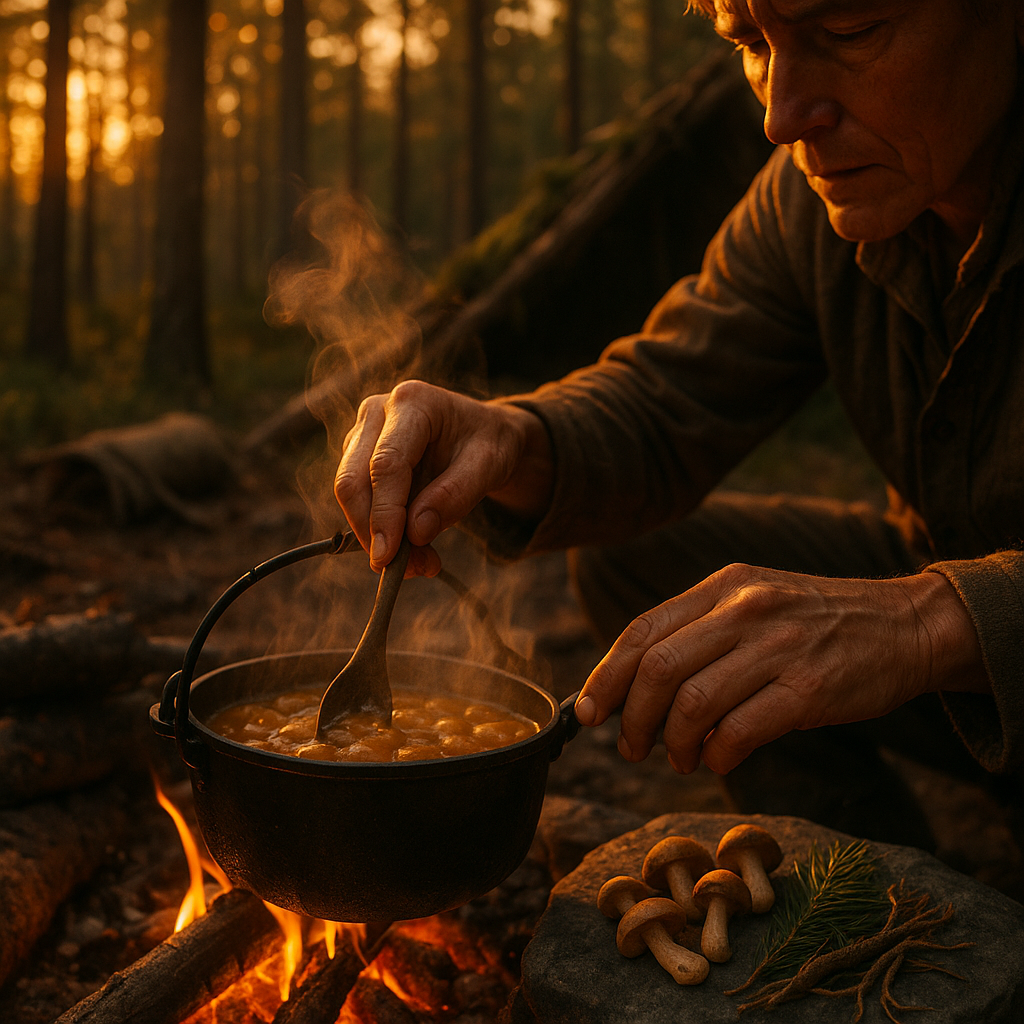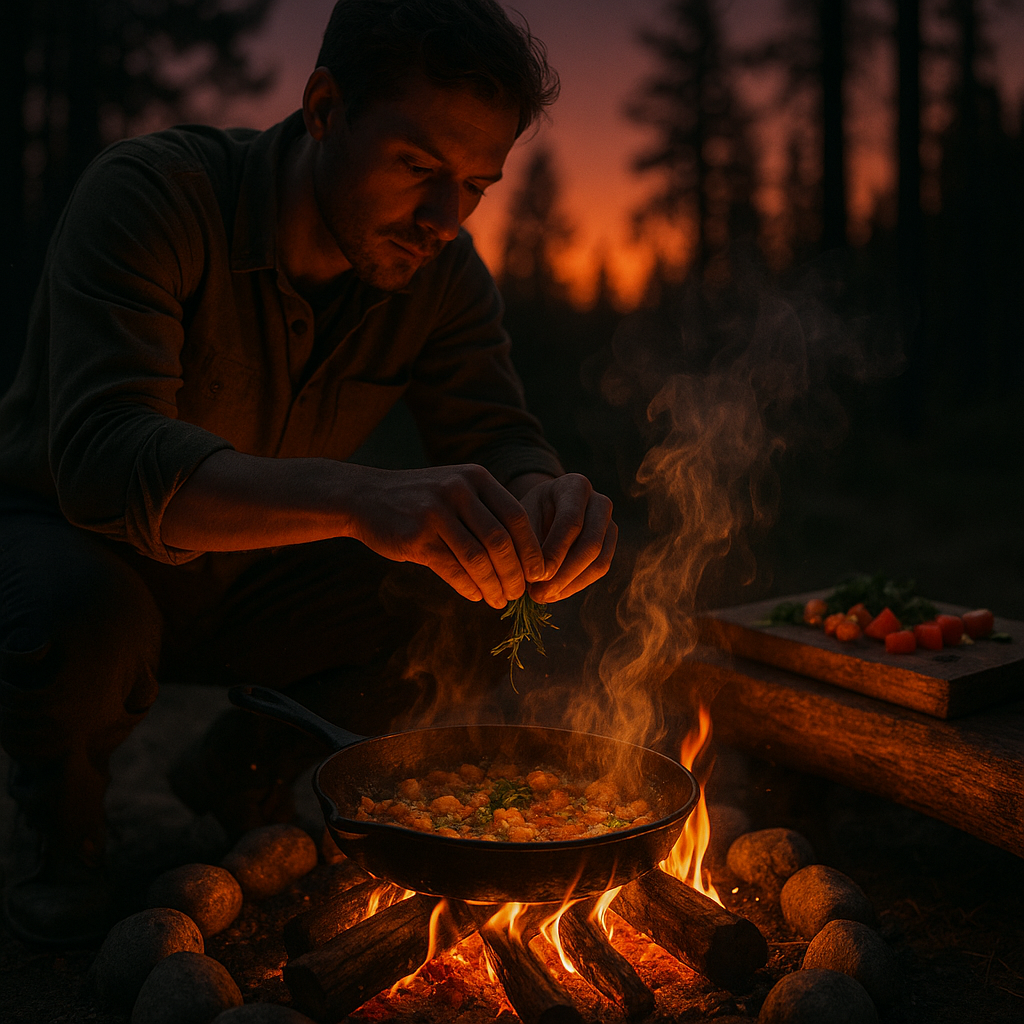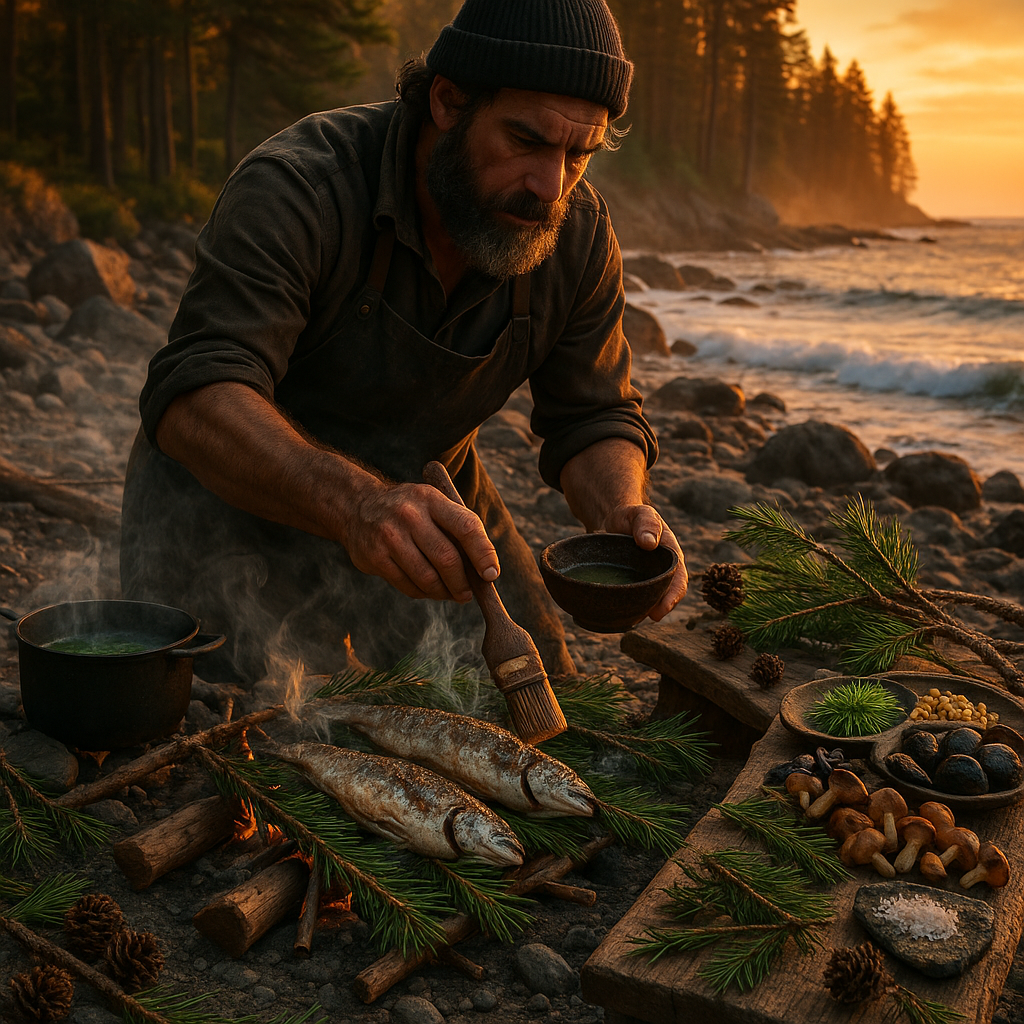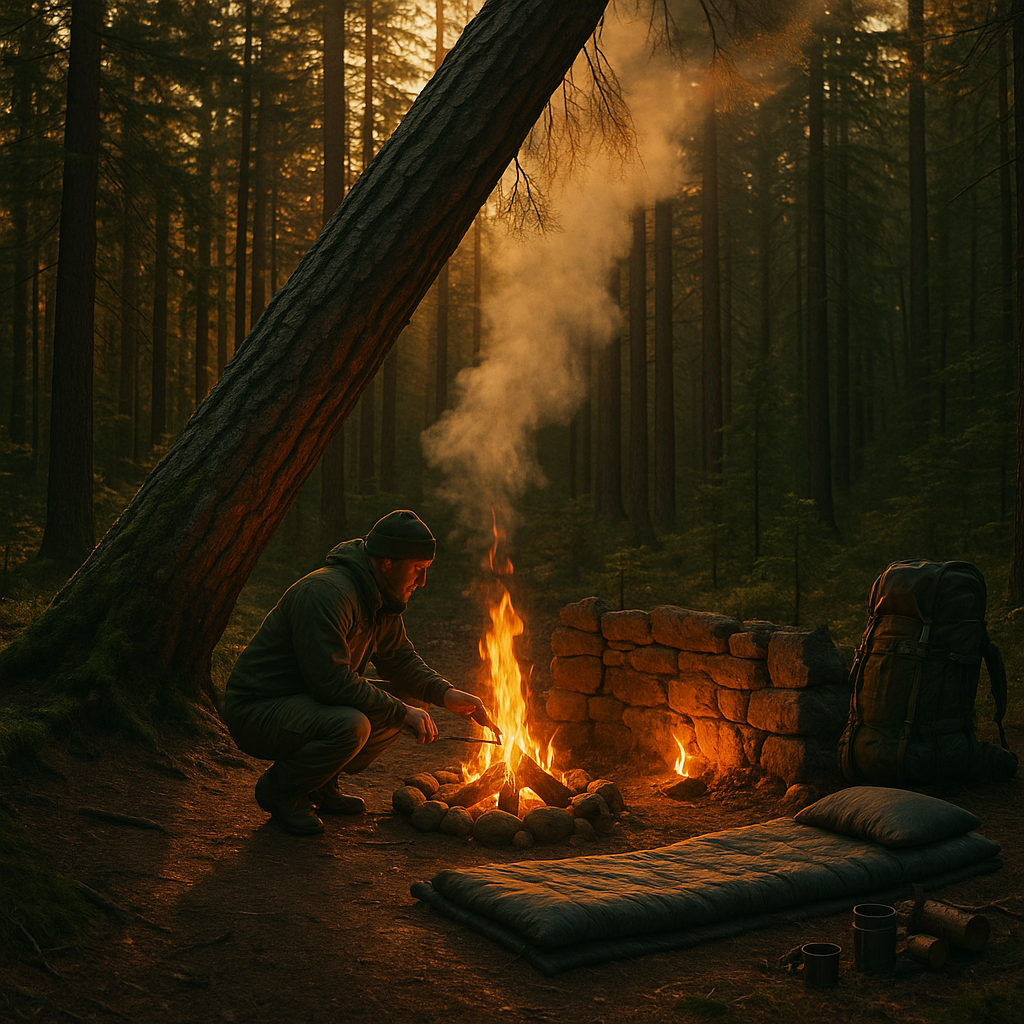Key Takeaways
- Transform meals into a lifeline for mental clarity: Cooking in disorienting moments, whether out in the wild or navigating deep grief, grounds the mind. It provides a rhythmic certainty when inner worlds feel chaotic, offering a lifeline to mental clarity.
- Embrace elemental techniques when resources dwindle: When stripped to the essentials, field cooking—simple broths, fire-roasted roots, and foraged greens—proves that resourcefulness and simplicity can nourish both body and spirit.
- Rediscover lost skills, reclaim lost pieces of self: Relearning basic cooking techniques during tough times is a gentle act of defiance against apathy or overwhelm, reconnecting you with agency and self-worth.
- Feed yourself with ritual, not just calories: The process of preparing food (chopping, stirring, waiting) becomes a mindful ritual. This practice provides comfort and a sense of presence, even in the loneliest wilds or challenging life chapters.
- Field techniques echo ancestral wisdom for survival: Practices like jerky-making, wild plant foraging, and minimal-gear meals are not only practical. They also honor the lineage of survival, celebrating adaptability and reverence for nature’s gifts.
- Let food preparation become psychological first aid: In grief or uncertainty, the act of feeding yourself is a form of self-care, helping to soothe the nervous system and cultivate small, meaningful moments of renewal.
- Cooking while lost rekindles a forgotten intimacy with the world: The acts of gathering, preparing, and eating in unfamiliar terrain reignite awe. This process reconnects us with nature, memory, and the simple act of being alive.
As you move into the main story, you’ll discover practical guidance, evocative stories, and gentle encouragement to nourish yourself, wherever you find yourself, both in body and in soul. Sometimes, the journey home begins quietly, with the soft crackle of a fire and the scent of something simmering, right where you stand.
Introduction
Getting lost, whether tangled in the wild brambles or adrift in the shadows of grief, is never something we plan for. Yet when every known landmark disappears and the world feels unrecognizable, cooking in these moments offers an unexpected compass: the warmth of fire, the steady rhythm of knife against root, and the restorative aroma drifting from a humble pot over open flame.
Every mindful act of food preparation during such times does more than fill your stomach. It helps gather together the scattered pieces of yourself left by chaos or uncertainty. Survival is not only a test of enduring the wilderness, but also of navigating the wilds within. Here, resourceful, elemental field cooking techniques become both sanctuary and ritual. Let’s explore how the simple act of nourishment becomes a beacon for clarity, renewal, and wonder, no matter how far from home you may feel.
Navigating Disorientation: The Intimate Ritual of Cooking While Lost
Whether you are deep in the woods or moving through the fog of sorrow, the act of cooking transforms from mere sustenance to something more profound. It anchors you to the present, ties you to memory, and kindles hope. If your compass has spun out on a winding trail or your heart feels heavy in the stillness of a city apartment, cooking while lost allows you to reclaim a small corner of certainty within chaos.
Stay Sharp. Stay Ahead.
Join our Telegram Channel for exclusive content, real insights,
engage with us and other members and get access to
insider updates, early news and top insights.
 Join the Channel
Join the Channel
Food Preparation in Challenging Situations
In times when comfort and familiarity have evaporated, even the basic act of preparing food can feel monumental. Yet, during these moments, field food techniques reveal their quiet strength. Practical nourishment intersects with emotional renewal in a deeply tangible way.
- Resourceful Ingredient Gathering: No matter your circumstances (lost in wilderness or adrift in emotion), perfection is not the goal. Nourishment begins with what you have: foraged greens, leftover grain, or a hidden can of beans. Finding and choosing even a single ingredient is an act of resilience, reconnecting you to your own unfolding story.
- The Simplicity of Fire: While survival guides may teach the technicalities of building a fire, in moments of disorientation, fire’s magic is in its presence. It gives warmth to cold hands, its crackling becomes an anthem of life continuing. By gathering twigs, pine needles, or soft lint for tinder, and tending to a careful circle of flame, you create both comfort and a sense of control.
Embracing the elements (wood, water, heat) serves as a powerful reminder of your own aliveness. Gathering ingredients and kindling a fire is more than a physical act; it’s a ritual preparing you to find agency and solace amid the unfamiliar.
Basic Cooking Techniques for Those Who’ve Lost Skills
For those who find themselves estranged from the kitchen, whether through trauma, time, or the conveniences of city life, the return to simple techniques is a gentle reclamation of self as well as a path to nourishment.
- One-Pot Wonders: The oldest and truest form of field cooking is forgiving and reassuring. Simply toss together whatever starchy roots, preserved meats, or wild herbs you have into a pot with some water or broth, and let it simmer. This approach reduces both stress and cleanup, reminding you that nourishment does not require perfection, only care and presence. For a deeper exploration of how minimalist fire cooking and one-pot meals create meaningful journeys, see one pot storytelling.
- Flatbreads and Ash Cakes: Across the world and throughout history, flatbread serves as a cornerstone of survival. Combine flour (or finely ground wild nuts if available) with water and a pinch of salt. Shape the dough into rough rounds and cook directly on a hot rock or skillet over your fire. The resulting bread is humble, nourishing, and comforting; an elemental taste of resilience. For more on ancient rock cooking methods that endure through the ages, discover primitive outdoor tools.
- Improvised Utensils: Lacking the tools of civilization? Craft skewers from green twigs, shape a flat stone into a griddle, or use your pocketknife for slicing. The very process of inventing these tools returns your attention from worry to the opportunities at hand. Explore the skills behind building a functional wild kitchen with only a blade in essential wilderness knife skills.
- Safe Food Handling: Even in crisis, food safety is vital. Always boil questionable water, and peel or thoroughly cook any unknown wild plants. These mindful preparations not only reduce risk, but offer a sense of restored control.
As you lean into these elemental skills, observe how each step (a handful of wild nettles, a warm round of flatbread, the scent of woodsmoke) reminds you of your capacity to create warmth and nourishment, regardless of where you have wandered.
Food Preparation as Psychological Healing
Cooking in times of disorientation serves as an anchor and a lifeboat. The repeated gestures of chopping, stirring, and layering ingredients offer a natural meditation, settling frayed nerves and centering scattered thoughts.
How does cooking help with the grieving process? Preparing food awakens the senses: the hiss and pop of simmering broth, the savor of bread beneath your fingers, the shimmer of flame in dusk. These sensory cues break through numbness and remind you that comfort and beauty still exist, even if found in fleeting moments. Choosing what to make, however limited the choices, instills a sense of agency and self-determination. Many find solace in preparing foods tied to memory, like a soup once made by a grandparent or a wilderness catch reminiscent of simpler days. These acts can spark healing tears, unexpected laughter, and small moments of wonder.
An example from British Columbia illustrates this healing power. A wilderness therapist observed as a group of young adults, each bearing the scars of trauma, found steadiness in preparing meals together over campfire. The nightly collaboration softened silence and grew trust; over six weeks, group anxiety diminished and a shared sense of belonging took root. The act of cooking together became both remedy and bond.
Real-World Stories: Survival, Memory, and Renewal
The journey from disorientation to renewal is illuminated by countless stories from across the globe.
Take, for instance, Sara, a solo hiker unexpectedly lost in the volcanic valleys of Iceland. Amid fear and exhaustion, she managed to start a fire using only damp moss and driftwood. Her supplies were meager: a tin of sardines, a chunk of rye, and wild angelica leaves gathered along the river. While toasting bread over the heat, Sara recalled childhood picnics with her late mother. That meal, humble as it was, became a bridge back to herself. It marked the first moment since her mother’s funeral that she truly felt comforted and anchored.
In city apartments, the ritual persists. Raj, a recent widower, began each lonely night by cooking a simple dhal with whatever vegetables he had on hand and a flickering candle nearby. Over time, the act became a gentle assertion that life, though transformed, continued spoonful by spoonful.
When survival cooking meets emotional suffering, the simplest meal becomes an act of hope and self-kindness. Stories like Sara’s and Raj’s reveal hidden psychological benefits: restoring identity, kindling memory, and building trust in both nature and ourselves.
Practical Field Food Techniques: Safety, Tools, and Comfort
Uncertainty demands creativity, flexibility, and careful attention. Whether lost in the wild or feeling unmoored by personal struggles, these core approaches provide both safety and comfort:
- Multipurpose and reliable tools: Carrying a sturdy knife, fire starter, and a versatile pot opens up countless possibilities. Handling and trusting these essential tools instills a sense of confidence and ability. If you’re considering the importance of the right blade for solo field cooking, see wilderness knives.
- Reliable, forgiving ingredients: Foods such as lentils, oats, smoked fish, dried fruits, and hard cheeses require little refrigeration and effort. Their familiarity can provide reassurance, offering the taste of home even far from it.
- Stay hydrated and well-fed: When appetite fades, nourishing yourself with broths or simple bites can stabilize mood, energy, and resilience. Discover how to craft nutrient-rich wild broths and fire-made stews with natural charcoal cooking.
- Adapt and improvise: A broken spatula can be replaced by a stick; lacking a bowl, carve one from green wood. The process of adapting fills the mind with possibility rather than helplessness.
Each field cooking challenge becomes a subtle lesson, illuminating strengths you may have forgotten or never realized. The meal, however imperfect, becomes a testament to resourcefulness and spirit.
Culinary Roots: Tradition, Memory, and Cultural Connection
Crisis food often draws from deep cultural wells, making cooking while lost an act of personal and communal reconnection.
- Ancestral techniques and traditions: From Indigenous stone boil soups in birchbark vessels to riverside porridges and hearty flatbreads made over embers, communities around the world have long relied on nature and creativity. Adapting these methods (perhaps by making a simple stew inspired by a grandmother’s memory) bridges the present with the wisdom of generations. Explore the intersection of outdoor cooking, fire traditions, and generational wisdom in indigenous foodways.
- Rituals of foraging and gathering: Cultures worldwide thrive on the practice of gathering, foraging, and sharing meals during hardship. Small acts like plucking wild herbs or kneading dough by a campfire can restore shared humanity, making even strangers feel like family. They remind us that our struggles are part of a much larger story.
Field meals, whether atop wind-swept mountains or beside quiet rivers, become links in a global chain, holding together stories of resilience, survival, and hope.
Cooking in moments of loss is never just about sustenance. It is an act of finding meaning, staking hope amid adversity, and reaffirming the enduring strength of spirit. Whether shaded by ancient pines or surrounded by urban walls, preparing a simple meal soothes the soul and whispers: you are still here, and where there is fire, there is possibility. With each careful step, from confusion to creation, the ritual of cooking leads us onward, toward wholeness, discovery, and new beginnings.
Stay Sharp. Stay Ahead.
Join our Telegram Channel for exclusive content, real insights,
engage with us and other members and get access to
insider updates, early news and top insights.
 Join the Channel
Join the Channel
Conclusion
Cooking while lost, whether in the heart of wild landscapes or in silent rooms of grief, evolves into more than mere survival. It becomes reclamation, memory, and a wordless testament to human endurance. By using what the moment provides and embracing elemental techniques, we nourish not just our bodies but also the deeper currents of identity, tradition, and hope. The act of foraging wild greens, shaping bread over glowing embers, or stirring humble stew draws us into a ritual of grounding (a connection that bridges generations, unites distant loved ones, and reignites our resilient selves).
In the end, this intimate dance between food and flame speaks quietly but powerfully. Even in disarray, creating and sharing a meal grounds us, soothes our thoughts, and rekindles an inner fire that persists beyond the darkest hour. Food becomes not just nourishment but a language of survival, remembrance, and renewal, beckoning us to gather around the next fire, ready for the story that awaits. Looking forward, those who embrace these elemental rituals (and the wonder that flows from them) will find both comfort and courage, shaping not only their own journeys but also inspiring others to rediscover life, flavor, and belonging wherever the road leads.
List of Inserted Links:
-
One Pot Storytelling: Crafting Meaningful Meals Over Fire
https://firestone-feast.com/one-pot-storytelling-crafting-meaningful-meals-over-fire -
Primitive Outdoor Tools: The Enduring Art of Stone Cooking
https://firestone-feast.com/primitive-outdoor-tools-the-enduring-art-of-stone-cooking -
Essential Wilderness Knife Skills: Build Your Own Wild Kitchen
https://firestone-feast.com/essential-wilderness-knife-skills-build-your-own-wild-kitchen -
Wilderness Knives: The Solo Adventurer’s Guide to Campfire Cooking
https://firestone-feast.com/wilderness-knives-the-solo-adventurers-guide-to-campfire-cooking -
Natural Charcoal Cooking: How to Craft Healing Soups in the Wild
https://firestone-feast.com/natural-charcoal-cooking-how-to-craft-healing-soups-in-the-wild -
Indigenous Foodways: Fire, Tradition & Wisdom in Outdoor Cooking
https://firestone-feast.com/indigenous-foodways-fire-tradition-wisdom-in-outdoor-cooking





Leave a Reply